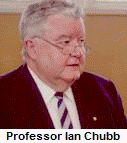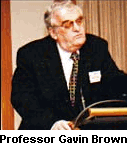|
Editorial-28 February 2005 |
  Can the Amalgam Become Greater Than the Sum of the Parts? |
 It all started in a
Chilean winery or something like that. Two large square faced alpha males who
don't take kindly to being contradicted and have been prepared to tell the
Government publicly that the university sector is in crisis (Ian Chubb) or
describe the Minister for Education, Science and Training, Brendan Nelson, as
the prince who transformed himself into a frog (Gavin Brown) were hatching a
plan, or at least fossicking for an embryonic stem cell. In due course the sketch of the plan was
passed over to the pro vice-chancellors to fill in -- give them something
worthwhile to do.
It all started in a
Chilean winery or something like that. Two large square faced alpha males who
don't take kindly to being contradicted and have been prepared to tell the
Government publicly that the university sector is in crisis (Ian Chubb) or
describe the Minister for Education, Science and Training, Brendan Nelson, as
the prince who transformed himself into a frog (Gavin Brown) were hatching a
plan, or at least fossicking for an embryonic stem cell. In due course the sketch of the plan was
passed over to the pro vice-chancellors to fill in -- give them something
worthwhile to do.
Seeing their universities (both men are rather proprietary about their charges) inexorably descending the maelstrom as senior staff retire not to be replaced; as the best of the young graduates and postdocs migrate offshore (1999 Young Australian of the Year Bryan Gaensler is now Assistant Professor at the Harvard-Smithsonian Center for Astrophysics); as research infrastructure continues to decay and the promise of new funding to begin in 2006/07 will slow the rot but do little to reverse it; as teaching and administrative loads continue to become heavier and more onerous, and as all the while the ministers for education, science and training, and employment and workplace relations approach the universities with the attitude of "you hold 'em, I'll hit 'em" -- said Chubb to Brown or Brown to Chubb, "this has gotta stop how about let's join forces."
And so far that's really all we know. There are no details of any consequence available. Therefore, it's small wonder that the media took virtually no notice. The Australian's Higher Education Section had two articles by because he got an exclusive for the Wednesday edition, but outside of hopeful noises coming from the two vice-chancellors little has been detailed. As far as we are able to determine, the only other notice taken was two short ABC items, one a local Canberra item the other for the regionals.
"I think that we should be looking at ways of sharing resources in order that we might be more significant on the world stage. ...We are always aware that particularly the US universities have just got much more firepower than Australia in terms of resources." Gavin Brown. "If you've got two of Australia's very best going out there and sharing some of the costs and requirements of international marketing, then we stand to gain much more than either of us alone. I expect Sydney and ANU would offer foreign students a magical opportunity," Ian Chubb; while Professor Brown pointed out, "One of the problems with attracting people, especially those from overseas, is to provide them with the research base to have a serious team in a seriously equipped lab that allows them to do serious work on the world stage."
In broad terms the universities will offer new co-operative research programs, as well as joint bids for new centres and resources; joint graduate coursework degrees and honours degree programs, and joint undergraduate courses which will be co-badged, allowing students to move between different courses with reciprocal credit and guaranteed enrolment. But just what this will mean in practice remains to be seen. Of itself that isn't going turn a loose cooperative venture into a world beater. It's going to take billions of dollars and a decade to bring the infrastructures and staffs to a point whereby the universities can be thought to be comparable to say the University of California, Berkeley; ETH, Zürich; or Cambridge, let alone Stanford or Harvard. It should be remembered that the world's top universities are moving targets. For example the currently embattled President of Harvard, Larry Summers, has a US$4 billion upgrade under development to ensure his university stays top of the heap and attracts the best researchers and scholars.
Does it matter?
If you're Brendan Nelson and your principal goal is to become deputy leader of the Liberal Party with a view to becoming Prime Minister, probably not.
If you're just a member of the hoi polloi and the nation's per capita income (based of course on purchasing price parity) is of consequence, it does and it will.
Can Ian Chubb and Gavin Brown garner the billions and find the time and energy to realise their dream or is it really just so much eye wash? The two of them are probably the only two Australian V-Cs who may be able to pull it off -- or at least get it underway. Because herein lies another problem, Professor Brown has just turned 63 while Professor Chubb had his contract renewed last year to 2009. In contrast Harvard's Summers is 50.
The media disinterest doesn't bode well, while in the meantime nothing further has been publicised regarding the prospect of ANU floating a $100 million CPI indexed bond issue.
Alex Reisner
The Funneled Web
